|
|
|
Sort Order |
|
|
|
Items / Page
|
|
|
|
|
|
|
| Srl | Item |
| 1 |
ID:
015989
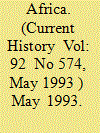

|
|
|
| 2 |
ID:
161008
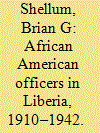

|
|
|
|
|
| Summary/Abstract |
This article tells the story of the first American military training mission undertaken in Africa. Between 1910 and 1942, seventeen African American officers trained, reorganized, and commanded the Liberian Frontier Force to defend the West African country of Liberia. This stability mission helped Liberia avoid territorial partition by Britain and France and defeat a series of indigenous rebellions, enabling the Americo-Liberian republic to survive a perilous period in its history.
|
|
|
|
|
|
|
|
|
|
|
|
|
|
|
|
| 3 |
ID:
119284
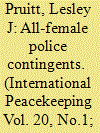

|
|
|
|
|
| Publication |
2013.
|
| Summary/Abstract |
This article focuses on women's involvement in peacekeeping operations and the introduction in 2007 of an all-female formed police unit (FFPU). Possible benefits and challenges of deploying all-female contingents in peace operations are considered and feminist theories of international relations are drawn upon to evaluate arguments for including women in peace and security missions. Media discourses on the Indian FFPU deployed to Liberia in 2007 are analysed, revealing a potential to reshape attitudes about the role of women in peace and security, and emphasizing that femininity need not be incompatible with strength and capacity for protection.
|
|
|
|
|
|
|
|
|
|
|
|
|
|
|
|
| 4 |
ID:
188713
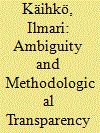

|
|
|
|
|
| Summary/Abstract |
Researchers who study civil wars and other armed conflicts are bound to face ambiguities. This article continues the discussion about research brokers in conflict zones that started in a 2019 special issue of Civil Wars and scrutinises the finding that Liberian wartime command structures continue to linger in informal guises long to the post-conflict. Absent transparent acknowledging of the ambiguities it glosses over, past scholarship risks a far too neat story that imbues arguments with untested assumptions. The result neither captures the complexity of contemporary realities of Liberian former combatants nor helps Liberia to move forward from its difficult past.
|
|
|
|
|
|
|
|
|
|
|
|
|
|
|
|
| 5 |
ID:
082226
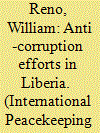

|
|
|
|
|
| Publication |
2008.
|
| Summary/Abstract |
International agencies intervene to promote reform in Liberia with promises to remake the country. Yet elections produce victories for former wartime commanders and officials accused of corruption. Many of these people continue to play important roles in the economy and command vocal followings. International organizations face a choice between a more radical intervention that amounts to a counterinsurgency operation to remove these people from their positions at the risk of creating political instability, and tacit acceptance of their power. Looking beyond these choices, is it possible that corrupt members of the elite and insiders can contribute to economic growth and political stability? Comparison of the organization of corruption in Liberia with models in East Asia indicates that political networks rooted in Liberia's economy may offer the promise of helping to integrate ex-combatants into the economic life of the country and address local demands for participation in politics.
|
|
|
|
|
|
|
|
|
|
|
|
|
|
|
|
| 6 |
ID:
133430


|
|
|
|
|
| Publication |
2014.
|
| Summary/Abstract |
This paper analyses anti-corruption efforts in post-conflict Liberia. It highlights citizens' views on the definition of corruption and argues that, in the past, anti-corruption efforts have often focused on institution building and formal justice mechanisms without sufficient understanding of accountability dynamics on the ground. Anti-corruption approaches in Liberia have only nominally examined whether there is a shared understanding of what 'corruption' is and why it is regarded as a problem. The paper examines the social norms and perceptions that underlie understandings of the term corruption. It argues that the international community may have overlooked the fact that 'corruption' has become an all-encompassing term that masks a myriad of differing priorities and concerns. The authors posit that 'accountability' may be a more useful lens for those actors hoping to improve governance in these contexts.
|
|
|
|
|
|
|
|
|
|
|
|
|
|
|
|
| 7 |
ID:
134293
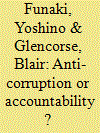

|
|
|
|
|
| Summary/Abstract |
This paper analyses anti-corruption efforts in post-conflict Liberia. It highlights citizens’ views on the definition of corruption and argues that, in the past, anti-corruption efforts have often focused on institution building and formal justice mechanisms without sufficient understanding of accountability dynamics on the ground. Anti-corruption approaches in Liberia have only nominally examined whether there is a shared understanding of what ‘corruption’ is and why it is regarded as a problem. The paper examines the social norms and perceptions that underlie understandings of the term corruption. It argues that the international community may have overlooked the fact that ‘corruption’ has become an all-encompassing term that masks a myriad of differing priorities and concerns. The authors posit that ‘accountability’ may be a more useful lens for those actors hoping to improve governance in these contexts.
|
|
|
|
|
|
|
|
|
|
|
|
|
|
|
|
| 8 |
ID:
138420
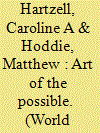

|
|
|
|
|
| Summary/Abstract |
Although there is now a wealth of scholarship concerning the onset, duration, and termination of civil wars, there is not nearly as much empirical research by political scientists on the potential for postconflict democratization in countries that have been the site of civil wars. This relative scholarly neglect of post–civil war democratization stands in contrast to the efforts and resources that other actors—foreign ministries, international and nongovernmental organizations, and members of civil society—have invested in attempting to help construct democracy in postconflict states such as Indonesia, Liberia, and Uganda.
|
|
|
|
|
|
|
|
|
|
|
|
|
|
|
|
| 9 |
ID:
143798
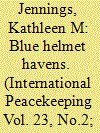

|
|
|
|
|
| Summary/Abstract |
It is commonly argued that international peace interventions will work better and more empathetically if the prevailing separation between international interveners and local people is lessened. However, I argue that, outside the microeconomic interactions and transactional relationships that comprise the peacekeeping economy, peacekeeping is characterized by bypassing – intentional circumvention – or simple exclusion of the local. Drawing on fieldwork in Liberia and the Democratic Republic of the Congo, I argue that the rules and regulations, norms and architecture of UN peacekeeping all favour and are actively disposed to bypass or exclude. Accordingly, insofar as lessening the separation between internationals and locals is necessary to enable more effective and, ideally, empathetic peacekeeping, what is needed is systemic change that runs counter to the – mostly deliberate – policies that have been enacted to effectuate and retain this very separation over the past decade or more. The likelihood of such change is small.
|
|
|
|
|
|
|
|
|
|
|
|
|
|
|
|
| 10 |
ID:
072542
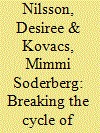

|
|
|
|
|
| Publication |
2005.
|
| Summary/Abstract |
This article analyses the prospects for sustainable peace in Liberia. The implementation of the 2003 peace agreement has largely been successful, but there are reasons for concern. Liberia's history of repeated cycles of violence and fragile peace provides valuable lessons for the current peace process. The article argues that Liberia's future is contingent on three critical aspects. First, the management of the immediate and long-term security challenges in terms of the reconstruction of the security forces, the reintegration of ex-combatants and the management of spoilers. Second, the capacity and willingness of the new government to promote democratic progress and good governance. Third, the political developments in the neighbouring region.
|
|
|
|
|
|
|
|
|
|
|
|
|
|
|
|
| 11 |
ID:
105085
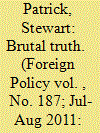

|
|
|
|
|
| Publication |
2011.
|
| Summary/Abstract |
The last 20 years -- so blandly labeled the "post-Cold War era" -- might as well be known as the "Age of Failed States." After decades of confronting Soviet power, successive U.S. administrations suddenly became embroiled in and bedeviled by the world's most dysfunctional countries. Although great-power competition persists, it is often the world's basket cases -- from Somalia to Afghanistan, Haiti to Liberia, and Pakistan to Yemen -- that dominate the U.S. foreign-policy agenda. This trend began in the early 1990s, when a shocking outbreak of state collapse and internal violence, including but by no means limited to episodes of genocide in the former Yugoslavia and Rwanda, seemed to herald a "new world disorder," in the words of British diplomat David Hannay.
|
|
|
|
|
|
|
|
|
|
|
|
|
|
|
|
| 12 |
ID:
171985
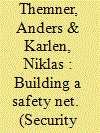

|
|
|
|
|
| Summary/Abstract |
The disarmament, demobilization, and reintegration of ex-combatants has become an integral part of peacebuilding. Although the main purpose of such interventions is to dissolve the military structures of armed groups, there is growing evidence that ex-combatant networks often remain intact. We investigate why such structures continue to thrive. We argue that ex-military networks are stronger when ex-commanders have weak links to elite patronage systems. Ex-combatants who are unable to rely on their former superiors for economic assistance must instead build denser ties to each other to gain access to a social safety net. To assess our argument, we conduct a comparative social network analysis (SNA) of two ex-military networks in Liberia. This innovative approach helps us uncover previously overlooked, but central, dynamics related to ex-combatant groups. We thereby show that SNA provides a range of underutilized tools and exact definitions that can increase our understanding of ex-military networks.
|
|
|
|
|
|
|
|
|
|
|
|
|
|
|
|
| 13 |
ID:
183922
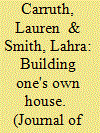

|
|
|
|
|
| Summary/Abstract |
This study uses ethnography along Ethiopian women's irregular migration routes through Djibouti to analyse the complex reasons women leave home to seek labour opportunities in the Gulf States. Theories and policies that either narrowly depict women's motivations as economic in nature or focus only on women's needs for security and protection, fail to account both for the politics of seeking employment abroad, and the ways migration provides women a potential refuge from various forms of violence at home. Using a feminist analysis, we argue that women do not migrate only for financial opportunities, but also to escape combinations of domestic, political and structural violence. As such, irregular migration both evinces a failure of asylum systems and humanitarian organisations to protect Ethiopians, and a failure of the state to provide Ethiopian women meaningful citizenship. Lacking both protection and meaningful citizenship, international migration represents women's journeys for opportunity and emancipation.
|
|
|
|
|
|
|
|
|
|
|
|
|
|
|
|
| 14 |
ID:
089343
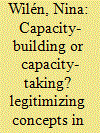

|
|
|
|
|
| Publication |
2009.
|
| Summary/Abstract |
This article critically analyses capacity-building and local ownership in the context of UN peace operations through interviews with UN staff and NGO representatives in Liberia and Burundi. The argument is that these concepts are left ambiguous and undefined to avoid accountability for peace operations while still functioning as value-adding and legitimizing discursive instruments for the latter. This article proves that the many paradoxes and contradictions surrounding the concepts clearly deter their operation in practice, while their positive connotations remain important, discursively, as legitimizing tools.
|
|
|
|
|
|
|
|
|
|
|
|
|
|
|
|
| 15 |
ID:
122240
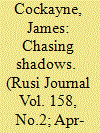

|
|
|
|
|
| Publication |
2013.
|
| Summary/Abstract |
Experience of conflict over the last two decades - from Haiti to Liberia to Afghanistan - points towards the likelihood that armed groups will adopt criminal strategies as a way of maintaining power during and after conflict, exploiting the state's vulnerability. However, policy responses have yet to prove effective in dealing with this threat. James Cockayne explores the relationship between criminal groups and political power, debunking longheld myths that such groups are primarily economic actors, before considering how a more strategic, evidence-based approach to tackling organised crime in conflict-affected states might be developed and implemented.
|
|
|
|
|
|
|
|
|
|
|
|
|
|
|
|
| 16 |
ID:
178170
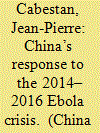

|
|
|
|
|
| Summary/Abstract |
The 2014–16 Ebola crisis in West Africa was China’s very first opportunity to demonstrate its willingness and ability to play a meaningful role in addressing public health emergencies of international concern. China’s decision to participate in the international response to the outbreak was part of an ambition to enhance its contribution to Africa’s security in general and health security in particular and to exert more influence on global norms. The specific role played by the People’s Liberation Army (PLA), especially its Academy of Military Medical Sciences, in Sierra Leone and Liberia is part of an ongoing effort to increase China’s involvement in international humanitarian assistance and disaster relief operations. It was the first time that it sent medical military teams to set up and operate infectious disease hospitals overseas. This participation also underscores the PLA’s crucial role in fighting epidemics overseas as well as at home, as the current COVID-19 pandemic illustrates. The Ebola crisis enables us to explore aspects of the PLA’s overseas missions, some of which are humanitarian and others which generally enhance China’s influence as a great power in Africa and in the world in the context of a growing Sino-US strategic competition.
|
|
|
|
|
|
|
|
|
|
|
|
|
|
|
|
| 17 |
ID:
143012
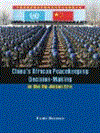

|
|
|
|
|
| Publication |
New Delhi, Vij Books India Pvt Ltd, 2015.
|
| Description |
232p.hbk
|
| Standard Number |
9789384464851
|
|
|
|
|
|
|
|
|
|
|
|
Copies: C:1/I:0,R:0,Q:0
Circulation
| Accession# | Call# | Current Location | Status | Policy | Location |
| 058425 | 327.51096/HER 058425 | Main | On Shelf | General | |
|
|
|
|
| 18 |
ID:
106089
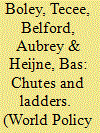

|
|
|
| 19 |
ID:
114191
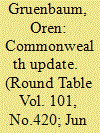

|
|
|
|
|
| Publication |
2012.
|
| Summary/Abstract |
There was little progress in negotiations over the disputed ousting of former president Mohamed Nasheed in the Maldives. In a landmark ruling, the former Liberian president Charles Taylor was found guilty of aiding war crimes and crimes against humanity in Sierra Leone's civil war. Malawi's vice-president Joyce Banda succeeded President Bingu wa Mutharika despite an apparent coup attempt by the brother and ministers of the late Mutharika. There were hopes of a 'Malaysian spring' as record numbers of protesters took to the streets. Pakistan's supreme court found the prime minister, Yousaf Raza Gilani, guilty of contempt of court. The kingdom of Barotseland declared it was seeking to secede peacefully from Zambia.
|
|
|
|
|
|
|
|
|
|
|
|
|
|
|
|
| 20 |
ID:
181421
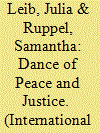

|
|
|
|
|
| Summary/Abstract |
This article investigates local perceptions of international peacebuilding in Sierra Leone and Liberia and explains the need for an inclusive framework addressing peace and justice at the same time. These neighbouring countries in West Africa not only share the burden of an intertwined conflict history but have also been described as prototypes for successful peacebuilding. However, both cases show striking differences with regard to the relative importance given to security and justice during the peace process and within the selected peacebuilding approaches. In Liberia, the peacebuilding framework was clearly sequenced, favouring security over justice. In Sierra Leone, it included a comprehensive TJ component, which was implemented alongside security-centred initiatives. In order to compare these two cases and to elaborate on the challenges of establishing both peace and justice in post-conflict settings with a more people-centred focus, we conducted expert interviews with (inter)national peacebuilding actors and opinion surveys, asking how the civilian populations themselves perceive the peace process and the effectiveness of international peacebuilding. The findings provide insights into local experiences with the inclusive peacebuilding framework implemented in Sierra Leone and the drawbacks of delaying justice and accountability in Liberia.
|
|
|
|
|
|
|
|
|
|
|
|
|
|
|
|
|
|
|
|
|